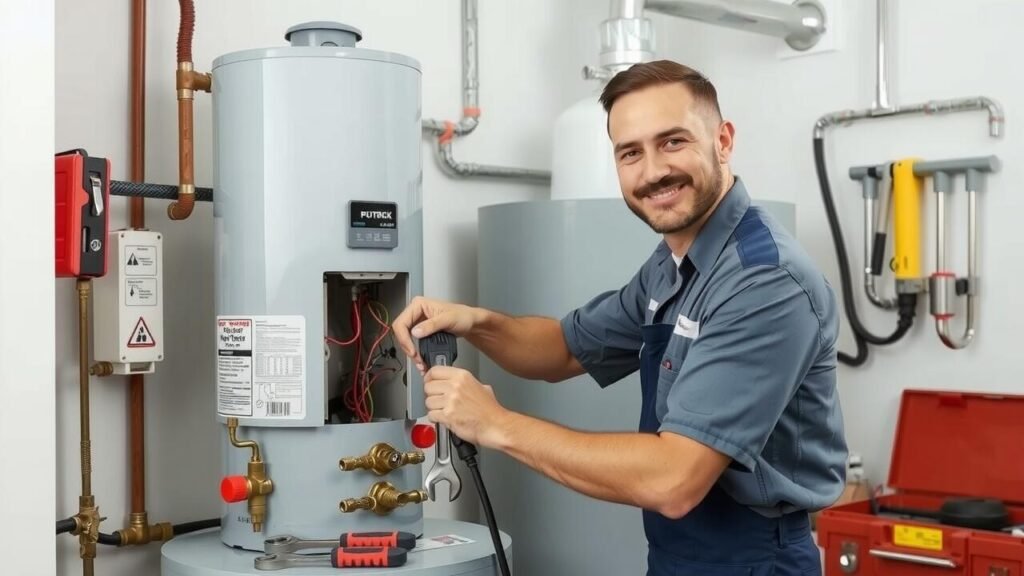DIY Installation vs. Professional Help
For some homeowners, opting for a DIY installation of a water heater can be an attractive option. This route can save significant labor costs, particularly if they have a knack for home improvement projects. However, tackling such a task requires a fundamental understanding of plumbing and electrical systems. With some research and preparation, homeowners may find themselves capable of successfully installing their new unit, which could also lead to a sense of accomplishment.
On the other hand, professional installation offers peace of mind and expertise that many may find valuable. Water Heater Repair and Installation in Utah is often handled by skilled technicians who are familiar with local building codes and safety regulations. This ensures that the installation meets necessary standards, reducing the risk of future issues. While the upfront costs may be higher, the long-term reassurance of a job done correctly can outweigh the benefits of a DIY approach, especially for those who are uncertain about their skills.
Cost-Saving Considerations
When considering a new water heater, the choice between DIY installation and hiring a professional often comes down to cost. A DIY approach may seem appealing due to the immediate savings on labor costs. However, unexpected issues can arise that may lead to additional expenses for tools or materials. Water Heater Repair and Installation in Provo, Utah, can provide invaluable insights into potential pitfalls that could turn an initially low-cost project into a financial burden if not executed correctly.
On the other hand, opting for professional installation may appear more expensive upfront. Yet, this investment can pay off over time, especially when considering warranties and the expertise that comes with trained professionals. They ensure that the unit is installed correctly, which can prevent future repair costs and enhance efficiency. By evaluating these cost-saving considerations, homeowners can make a more informed choice that looks at both immediate expenses and long-term financial impacts.
Warranty and Maintenance Expenses
Investing in a new water heater comes with various warranty and maintenance considerations. Most manufacturers offer warranties that cover specific parts for a set number of years. Depending on the brand and model, long-term warranties can provide peace of mind, reducing the financial burden of future repairs. Additionally, understanding warranty coverage is crucial, as improper installation may void it. Homeowners in need of professional assistance should consider companies that specialize in Water Heater Repair and Installation in Sandy, Utah, to ensure compliance with warranty terms.
Regular maintenance of water heaters can prevent costly repairs and extend the unit’s lifespan. Basic tasks like flushing the tank annually to remove sediment buildup can enhance efficiency and performance. However, some homeowners may prefer to seek professional services to handle maintenance checks. Regular servicing might incur additional costs but can lead to significant savings over time by identifying issues before they escalate. Proper maintenance helps ensure the water heater operates efficiently, aligning with the performance expectations set by warranty guidelines.
Long-Term Financial Implications
Investing in a new water heater involves more than just the initial purchase price and installation fees. Homeowners should consider the long-term financial implications that come with different types of water heaters. For instance, traditional tank models may be less expensive upfront, but they often have higher operational costs due to energy inefficiency. On the other hand, tankless or energy-efficient models might require a larger investment initially but can lead to significant savings on utility bills over time. Before deciding, it’s beneficial to weigh the long-term costs against immediate expenses.
In addition to the type of water heater, homeowners should factor in the potential costs of maintenance and repairs. Regular servicing can extend the lifespan of the heater and improve its efficiency, which is particularly important for homeowners in areas like Provo, Utah, where rapid temperature changes can strain the system. Engaging in proactive maintenance can mitigate unexpected repair costs and help ensure that the system operates optimally throughout its lifespan. Understanding these long-term financial implications allows homeowners to make informed choices about water heater repair and installation in Provo, Utah.
Energy Efficiency Ratings and Their Effect on Pricing
Energy efficiency ratings play a crucial role in determining the price of a new water heater. Units with higher energy efficiency ratings often come with a higher initial cost. These models typically use advanced technology, such as improved insulation and smart controls, to minimize energy consumption. Homeowners looking for long-term savings may find that investing in a more efficient unit pays off over time, despite the initial expense.
In the context of Water Heater Repair and Installation in Utah, understanding energy efficiency ratings can help you make a more informed decision. While a lower-rated model might seem like a budget-friendly option upfront, it may lead to higher utility bills in the long run. Choosing an energy-efficient water heater not only contributes to lower monthly costs but also has a positive impact on the environment.
Potential Savings on Utility Bills
Investing in a new water heater can lead to significant savings on utility bills over time. Modern water heaters, particularly energy-efficient models, are designed to reduce energy consumption compared to older units. By replacing an inefficient water heater with one that has a higher energy efficiency rating, homeowners can see a noticeable decrease in their monthly energy costs. This reduction can extend the lifespan of the unit, further enhancing savings.
Choosing Water Heater Repair and Installation in Utah provides an opportunity to capitalize on these savings. Local professionals often recommend models tailored to the specific energy needs of the region, ensuring optimal performance. Additionally, some states offer rebates or incentives for installing energy-efficient appliances, further offsetting the initial costs.
FAQS
What factors should I consider when deciding how much to charge for water heater installation?
You should consider the complexity of the installation, your level of expertise, the cost of materials, labor expenses, local market rates, and any additional services you may offer, such as removal of the old unit or disposal.
Is it more cost-effective to install a water heater myself than to hire a professional?
While DIY installation can save on labor costs, it’s important to factor in the risk of mistakes, potential damage, and the time investment required. Professional installation ensures compliance with local codes and safety standards.
How does the warranty affect the installation price I should charge?
Offering a warranty on your installation can justify a higher charge, as it provides customers with peace of mind. Ensure you understand the warranty terms and conditions to accurately communicate its value to potential clients.
What are the long-term financial implications of choosing different types of water heaters?
The type of water heater you choose (tank vs. tankless, electric vs. gas) can affect installation costs and long-term utility expenses. Energy-efficient models may have a higher initial cost but can lead to significant savings on utility bills over time.
How can energy efficiency ratings impact the pricing of a water heater installation?
Higher energy efficiency ratings often come with a higher upfront cost but can lead to lower utility bills. When charging for installation, consider educating customers on the long-term savings they could experience with more efficient models.

